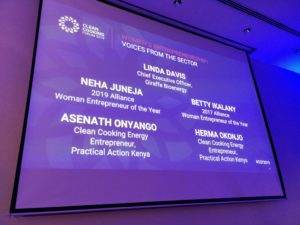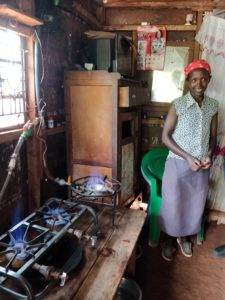Cooking is the biggest challenge of the energy access area, with at least 3 billion people relying on dirty fuels for cooking. This has massive negative health impacts, especially for women. 4 million people die prematurely every year due to indoor air pollution, mostly related to cooking on traditional stoves and fires. It’s a big problem, yet has rarely received much attention from policy-makers, and investment in the clean cooking sector has been woefully inadequate.
 But maybe this is changing at last? Hot on the heels of a number of new clean cooking commitments made at the UN Climate Summit in September, last week the Clean Cooking Forum in Nairobi gathered more than 500 participants from 50+ countries to discuss the themes of investment, innovation and impact. Co-hosted by the Clean Cooking Alliance and the Kenya Ministry of Energy, it featured a range of impressive speakers – from governments, investors, donors, researchers and business. And unlike at most other energy conferences I’ve been to recently, there were many female speakers. After all, cooking is mainly done by women. As one speaker noted, if men cooked and suffered the detrimental health consequences, we would have solved the problem long ago!
But maybe this is changing at last? Hot on the heels of a number of new clean cooking commitments made at the UN Climate Summit in September, last week the Clean Cooking Forum in Nairobi gathered more than 500 participants from 50+ countries to discuss the themes of investment, innovation and impact. Co-hosted by the Clean Cooking Alliance and the Kenya Ministry of Energy, it featured a range of impressive speakers – from governments, investors, donors, researchers and business. And unlike at most other energy conferences I’ve been to recently, there were many female speakers. After all, cooking is mainly done by women. As one speaker noted, if men cooked and suffered the detrimental health consequences, we would have solved the problem long ago!
Clean cooking is an important part of Practical Action’s transformative energy work and we were actively involved in the Forum. Jechoniah Kitala from our East Africa office was on the Kenyan Committee preparing the Forum and chaired a session on policy innovation and catalytic research. The final plenary session featured two of the inspiring women energy entrepreneurs we support through our Women in Energy Enterprises Kenya programme.
The Forum also saw the launch of “Clean Cooking Is…” – the first-ever global campaign exclusively created to drive greater awareness, engagement, and support for clean cooking –We are pleased to be part of this campaign.
 The Forum finished with a really interesting set of field visits, including to an improved cookstove factory, an electric cooking demonstration and a trip north of Nairobi to visit some biogas installations supported by the Africa Biogas Partnership Programme. It was hard to choose but I went for the latter as I have always been fascinated by how this ingenious technology can have so many benefits. Basically, you take a few buckets of cow slurry, put them in a digester with some water and you not only get clean cooking gas but also a really valuable fertiliser. This means women no longer suffer from the negative health impacts of smoke inhalation from inefficient biomass stoves, farmers don’t have to buy chemical fertilisers for their crops, and fewer trees are cut down. A win-win for people’s health, wallets and the climate!
The Forum finished with a really interesting set of field visits, including to an improved cookstove factory, an electric cooking demonstration and a trip north of Nairobi to visit some biogas installations supported by the Africa Biogas Partnership Programme. It was hard to choose but I went for the latter as I have always been fascinated by how this ingenious technology can have so many benefits. Basically, you take a few buckets of cow slurry, put them in a digester with some water and you not only get clean cooking gas but also a really valuable fertiliser. This means women no longer suffer from the negative health impacts of smoke inhalation from inefficient biomass stoves, farmers don’t have to buy chemical fertilisers for their crops, and fewer trees are cut down. A win-win for people’s health, wallets and the climate!
We were met by four very welcoming farming families (and friendly cows!) and were impressed how well the systems worked. Everyone had enough gas for cooking and while the costs of the systems were between US$500 and 1000, they paid back within a couple of years thanks to substantial savings from not having to buy charcoal and fertiliser. And of course the women were extremely happy to have smoke-free kitchens! There is also scope to further expand some of the systems to provide gas for productive uses such as milling or help heat homes during cold periods.
I come away from Nairobi with renewed hope that the clean cooking sector is finally being taken seriously. Here at Practical Action, we are contributing through some great clean cooking programmes, such our Darfur Clean Stoves carbon credit project and our forthcoming Poor People’s Outlook 2019 has a dedicated cooking chapter.